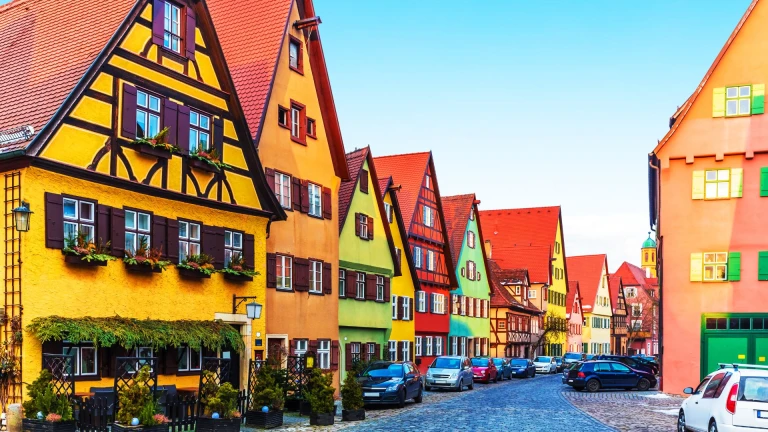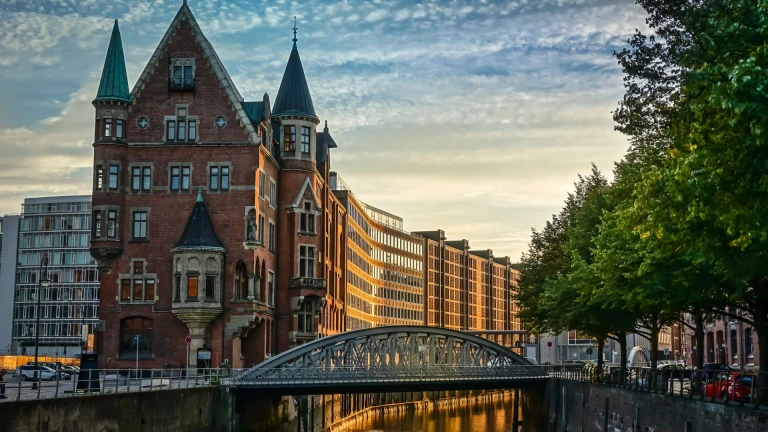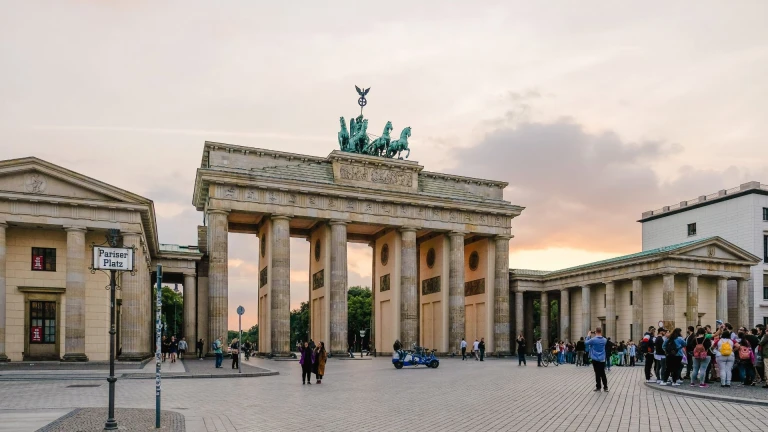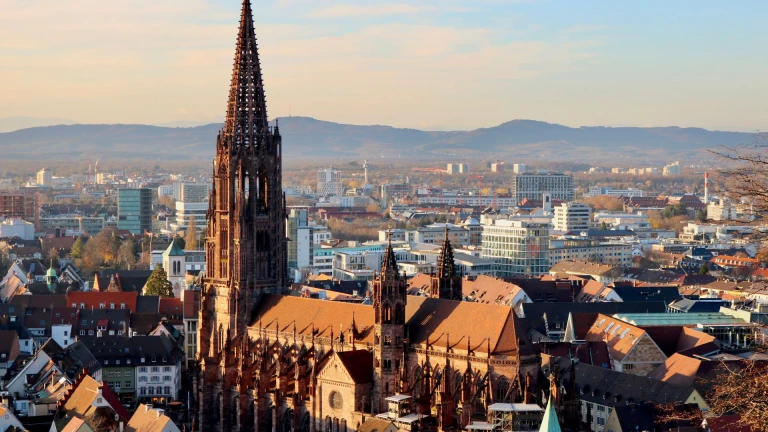This is How you can Move and Settle in Germany from India
Moving to a new country is an exciting yet challenging endeavor, and Germany stands out as an attractive destination for many individuals seeking new opportunities and experiences. This comprehensive guide aims to provide a detailed roadmap for those considering relocating from India to Germany. From understanding the visa processes to adapting to the cultural nuances, we'll cover every aspect to ensure a smooth transition.
Also Read: 10 Winter Experiences That Will Warm Your Heart

1. Understanding the Basics
Why Germany?
Germany is a top destination for individuals seeking new opportunities, offering a unique blend of economic prosperity, high-quality education, and an exceptional quality of life.
Economic Opportunities: The German economy is one of the largest and most robust in Europe, providing a myriad of job opportunities across various sectors. With a strong focus on innovation and technology, Germany is home to multinational corporations and thriving small to medium-sized enterprises, creating a diverse job market.
High-Quality Education: Germany boasts a world-class education system, with many universities consistently ranked among the best globally. The country's commitment to research and development makes it an ideal destination for those seeking advanced degrees and academic excellence. Most programs are offered in English, attracting international students from around the world.
Quality of Life: Germany is renowned for its high quality of life, characterized by efficient public services, excellent healthcare, and a strong social safety net. The country's commitment to environmental sustainability, well-developed infrastructure, and cultural richness contribute to an overall positive living experience.
Types of Visas
Understanding the various types of visas available is crucial for a successful move to Germany. Different visas cater to specific purposes, and selecting the right one is the first step in the relocation process. These are the most frequent German visa types:
Tourist & Visitor Visa – For people who wish to visit Germany to visit friends and relatives or just to sightsee and experience the country and its culture.
Family Reunion Visa to Join a Relative or a Partner – Which is a visa for family members of German residents who wish to join them in Germany.
Job Seeker Visa – This visa is designed for individuals actively seeking employment in Germany. It allows a stay of up to six months to attend job interviews and explore job opportunities. To be eligible, applicants typically need a recognized qualification, sufficient funds, and proof of health insurance.
There are a few minimum requirements you must meet in order to qualify for a job seeker visa:
You must have a valid passport.
You must have a university degree or an equivalent qualification.
You must have proof of sufficient financial means to support yourself during your stay.
You must have health insurance that covers the costs of medical treatment.
You must be able to demonstrate that you have made arrangements for your return transportation from Germany at the end of your stay.
Studying & Language Learning Visa – For foreigners who wish to enter the country with the sole purpose of attending a language course or to continue their studies at an educational institution in Germany. Students aspiring to pursue higher education in Germany must obtain a student visa. Along with an acceptance letter from a recognized German university, applicants need proof of financial means to cover living expenses and health insurance.
Working Visa – For people who have gotten a job in Germany. For those who have secured a job offer in Germany, the employment visa is the next step. It requires a binding job contract, and the employer often assists in the application process. This visa is usually issued for a limited duration, and the type of work permit depends on the nature of the employment.
Business Visa – For business people that need to remain in Germany for a period longer than 90 days within 6 months, with the purpose of making business.
Airport Transit Visa – Which is required for a very limited number of third-world nationals that need to pass through one of the German airports in their way to their final destination.
Guest Scientist Visa – For scientists or researchers who have been invited by an institution to carry out a study or research.
Training/Internship Visa – A visa that allows nationals of third-world countries to attend a training or internship.
Medical Treatment Visa – Has been established to permit foreigners with different illnesses and medical conditions to enter Germany and seek medical treatment
Trade Fair & Exhibitions Visa – For people planning to participate in a trade fair or exhibition.
Visa for Cultural, Film Crew, Sports, and Religious Event Purpose – For people who are planning to enter Germany under the purpose of participating at a Cultural, Sports, and Religious event or as part of a Film Crew.
The following documents are required for any Germany visa application:
Application Form – Duly completed with correct and honest answers that comply with the information in the other required documents. Do not forget that you can download the Germany Visa Application form here on our website.
Passport – According to the passport requirements of the German embassy, among which validity of three months beyond your planned stays in the Schengen.
Photo – Which must be taken within the last three months and according to the other photo standards set by the German embassy.
Health Insurance – A document that confirms you have obtained travel health insurance that covers illnesses and accidents, and even repatriation in case of death, as well as the whole Schengen Area with a minimum coverage of € 30.000.
Travel Itinerary – That includes proof of your round trip flight/travel reservations or other documents that show intended transport, as well as proof of what you are planning to do in Germany within the period that you wish to Remain
Proof of Financial Means – A document that proves you have the money to finance yourself during your planned stay in Germany. This can be a recent bank statement that shows you have enough funds to spend at least 45€ per each day spent in Germany. If proof of owner financing is not possible, the applicant can submit a formal declaration of a third person who is willing to finance their travel and stay in Germany alongside with proof of their financial means.
Depending on your visa type and in some cases in your country of residence and nationality, there are also other Germany visa requirements which you will need to submit as required by the embassy or consulate where you will be applying in your home country.
Germany Visa fees differ depending on the type of visa you are applying for, thus the motif of your travel. German and Europe visas, in general, are quite cheaper than visas to the US, Canada, or even India. Moreover, you can explore most of the old continent with a single visa.
Generally, a German short-stay visa fee is EUR 80 or INR 7274.66, whereas a long-stay visa is EUR 75 or INR 6819.99. However, you should check it out since there are some visa fee exemptions for a few categories of applicants.
Types of Residence Permits:
If you've finished your studies in Germany and wish to continue working there, obtaining a permanent residence permit is necessary. The application process involves submitting required documents, such as your passport, educational qualifications, and proof of a job offer, to the German embassy or consulate in your home country. Upon approval, you'll be granted a four-year valid resident permit.
There are two primary types of residence permits for Indian citizens:
Temporary Residence Permit (Aufenthalterlaubnis): This is the most common permit for foreigners, including Indians. It's initially valid for one year and can be extended through the relevant authorities.
Permanent Settlement Permit (Niederlassungserlaubnis): Non-citizens residing in Germany for five years or more are eligible for this permit.
Additionally, there's the European Union (EU) Blue Card, designed for foreign nationals with high qualifications willing to work in Germany. To be eligible, one must secure a job with an annual salary of at least €56,400. The EU Blue Card grants a four-year stay in Germany, with the option to convert it into a permanent settlement permit. Qualifications for the latter include proficiency in the German language, meeting specific financial criteria, and a minimum of 33 months of work in the country.

2. Navigating the German Job Market
2.1 Job Search Strategies
Online Job Portals: Numerous online platforms, such as LinkedIn, Xing, and popular German job portals like Monster and StepStone, are invaluable resources for job seekers. Creating a compelling online profile, networking, and actively searching for relevant job openings can significantly enhance your chances of securing interviews.
Networking: Building a professional network is crucial in Germany. Attending industry events, conferences, and local meet-ups can help establish connections. Germans value personal relationships in business, so networking is not just a means to find job opportunities but also a way to integrate into the professional community.
Recruitment Agencies: Engaging with recruitment agencies specializing in your field can expedite the job search process. These agencies often have extensive networks and can connect you with suitable employers. Submitting your CV to these agencies and attending interviews arranged through them can be a strategic move.
2.2 Recognizing Qualification Equivalences
Recognition Process: Germany places a high value on academic and professional qualifications. Before applying for jobs, it is essential to have foreign qualifications recognized by the appropriate authorities. The recognition process varies depending on the profession and is often handled by specific bodies or chambers.
Approaches for Different Professions: Certain professions, such as doctors, engineers, and teachers, may require additional certifications or examinations. Researching the specific requirements for your profession and initiating the recognition process early in your planning can help avoid delays in your job search.
2.3 Language Requirements
Importance of German Language: While many international companies and academic programs in Germany use English, learning German is crucial for effective integration into the workplace and daily life. German language skills enhance job prospects, especially in sectors where communication with local clients or colleagues is essential.
Language Learning Resources: Several language schools and online platforms offer German language courses. Taking language classes or using language-learning apps can significantly improve your proficiency. Integrating with local communities and practicing the language regularly are also effective ways to enhance your language skills.
Successfully navigating the German job market requires a proactive and multifaceted approach. Combining online strategies, networking efforts, and a commitment to language acquisition will position you for success in securing employment opportunities in Germany.

3. Cultural Transition
Understanding German Culture
Work Culture: German work culture is characterized by efficiency, punctuality, and a strong emphasis on professionalism. Understanding the hierarchical structure within organizations is essential. Meetings are typically well-organized and focus on the agenda. Addressing colleagues by their titles and maintaining a formal tone in professional communication are common practices.
Social Etiquette: Germans value personal space and may appear reserved at first. However, once a relationship is established, it tends to be sincere and reliable. Punctuality is highly regarded, and being on time for appointments and social gatherings is crucial. Germans also appreciate direct communication and may find indirect communication styles confusing.
Language and Communication
German Language Basics: While many Germans, especially in larger cities and professional environments, speak English, learning the basics of the German language is highly beneficial. Greetings, common phrases, and basic conversational skills not only enhance daily interactions but also contribute to a sense of belonging in the local community.
Communication Styles: Germans are known for their direct communication style. They value clarity and precision in verbal and written communication. Understanding the unspoken rules of communication, such as waiting for one's turn to speak and being concise in expressing ideas, will help integrate smoothly into professional and social settings.
Social Integration
Joining Clubs and Associations: Getting involved in local clubs, sports groups, or cultural associations is an excellent way to meet people and integrate into the community. Whether it's joining a language exchange group or participating in local events, these activities provide opportunities to make friends and build a support network.
Community Engagement: Attending local events, festivals, and community gatherings allows newcomers to experience German culture firsthand. Participating in neighborhood initiatives and volunteering can also foster a sense of community and help establish connections with locals.
Adapting to the cultural nuances of Germany is an integral part of the relocation process. Recognizing and respecting cultural differences will not only ease the transition but also contribute to a more enriching experience in your new home.

4. Accommodation and Cost of Living
Housing Options
Renting vs. Buying: The decision to rent or buy a property in Germany depends on various factors, including your long-term plans, financial situation, and the local real estate market. Renting is common, especially for newcomers, as it provides flexibility. Popular cities like Berlin, Munich, and Hamburg offer a range of rental options, from apartments to houses. Real estate websites and local property listings are valuable resources for finding suitable accommodations.
Popular Cities for Expatriates: Choosing the right city is crucial for your overall living experience. Berlin is known for its vibrant culture and diverse communities, while Munich boasts economic prosperity and a high quality of life. Hamburg offers a balance between a thriving job market and a rich maritime history. Researching each city's characteristics and considering your personal preferences will help you make an informed decision.
Cost of Living Breakdown
Monthly Expenses: Understanding the cost of living is vital for budgeting. Expenses include rent, utilities, groceries, transportation, health insurance, and leisure activities. Rent typically constitutes a significant portion of monthly expenses, with variations based on location and the type of accommodation. Health insurance is mandatory, and its cost varies depending on factors like age and coverage. Public transportation is efficient, and owning a car may not be necessary in some urban areas.
Budgeting Tips: Creating a detailed budget will help you manage your finances effectively. Researching local prices, comparing grocery stores, and taking advantage of discounts and loyalty programs can contribute to cost savings. Additionally, exploring free or low-cost cultural events and leisure activities can enhance your experience without straining your budget.
Summary of Cost of Living in Germany (rough estimates):
A family of four estimated monthly costs are ₹293,113.2 (3,214.6€) without rent.
A single person estimated monthly costs are ₹86,811.2 (952.1€) without rent.
Cost of living in Germany is, on average, 187.9% higher than in India.
Rent in Germany is, on average, 333.0% higher than in India.

5. Healthcare System
Mandatory Health Insurance
Public vs. Private Insurance: Health insurance is compulsory for residents in Germany. The country has a dual healthcare system, consisting of statutory (public) and private health insurance. Statutory insurance is the most common, covering basic healthcare needs. Private insurance is an option for certain individuals, often those with higher incomes or specific professional statuses. Choosing between public and private insurance depends on various factors, including income, age, and personal preferences.
Enrollment Process: Enrolling in health insurance is one of the initial steps upon arrival in Germany. Individuals with public insurance contribute a percentage of their income, while private insurance premiums depend on factors like age and health condition. Researching different insurance providers, comparing coverage, and understanding the terms and conditions will help you make an informed decision.
Accessing Healthcare Services
Finding a Doctor: Germany has a well-developed healthcare infrastructure, and finding a doctor is relatively straightforward. Local health authorities or your insurance provider can provide a list of doctors in your area. Many doctors speak English, especially in urban areas, but having basic German language skills can enhance your communication and understanding of medical advice.
Emergency Services: In case of emergencies, dialing 112 will connect you to the emergency services. Germany has a comprehensive emergency medical system, and hospitals are equipped to handle various medical situations. Knowing the location of the nearest hospital and understanding emergency procedures is essential for your safety and well-being.
6. Education Opportunities
Higher Education in Germany
Universities and Programs: Germany is home to many renowned universities offering a wide range of programs. Researching universities based on your field of study, faculty reputation, and program structure is crucial. Many programs are conducted in English, making them accessible to international students. The application process typically involves submitting academic transcripts, letters of recommendation, and a statement of purpose.
Scholarships for International Students: Various scholarships are available to support international students. The German Academic Exchange Service (DAAD) offers numerous scholarships for different levels of study and disciplines. Additionally, universities and private organizations provide financial assistance. Researching and applying for scholarships well in advance can help alleviate the financial burden of tuition and living expenses.
Schooling for Dependents
International Schools: For expatriates with school-age children, international schools are a popular choice. These schools often follow international curricula and provide education in English. The International Baccalaureate (IB) program is commonly offered. Researching the available international schools, understanding admission processes, and considering the commuting distance from your residence are essential factors in the decision-making process.
Local Education System: Understanding the local education system is crucial for expatriate families. Public schools in Germany provide education in German, and enrolling your child may involve language assessments. Private schools, while generally more expensive, may offer bilingual or English-language instruction. Researching schools, visiting campuses, and understanding admission requirements will help you make informed choices for your children's education.
Navigating education opportunities is vital for personal and family development. Whether pursuing higher education or arranging schooling for dependents, thorough research and planning are key to a successful educational experience in Germany.

7. Legal and Administrative Formalities
Residence Registration
Anmeldung Process: Upon arriving in Germany, one of the first administrative tasks is registering your residence (Anmeldung). This process involves visiting the local registration office (Einwohnermeldeamt) and providing necessary documents, including a valid passport, rental agreement, and a completed registration form. The Anmeldung is essential for obtaining various services, such as setting up a bank account and enrolling in health insurance.
Required Documents: Documents required for the Anmeldung process may vary slightly by city, but generally include a valid passport, rental agreement or confirmation from the landlord, completed registration form, and, in some cases, a confirmation from your employer or university.
Taxation in Germany
Understanding the Tax System: Germany has a progressive tax system, and residents are subject to income tax on their worldwide income. Familiarizing yourself with the tax brackets, deductions, and exemptions is crucial. The tax year in Germany runs from January 1st to December 31st.
Filing Tax Returns: Filing a tax return is a common practice in Germany, even if it's not mandatory for everyone. Many residents, especially those with additional income or specific deductions, choose to file a tax return to optimize their tax situation. Consulting a tax advisor or using online tax filing tools can be beneficial for navigating the complexities of the German tax system.
8. Building a Social Network
Expatriate Communities
Joining Expat Groups: Expatriate communities play a significant role in helping newcomers settle in Germany. Joining expat groups and online forums allows you to connect with individuals who have gone through similar experiences. These communities often organize events, language exchange programs, and provide valuable information on local services and resources.
Networking for Professional Growth: Building a professional network is essential for career development. Attending industry-specific events, joining professional organizations, and utilizing platforms like LinkedIn can help you connect with professionals in your field. Networking not only enhances your job prospects but also provides insights into the local business culture.
Networking for Personal Growth
Industry Events: Attending industry-related events, conferences, and meet-ups is an excellent way to expand your professional network. Many cities in Germany host regular events in various sectors, providing opportunities to meet like-minded individuals, potential employers, and collaborators.
Online Platforms: Utilizing online platforms such as LinkedIn can help you create a digital presence and connect with professionals in your industry. Engaging in discussions, joining relevant groups, and showcasing your skills can enhance your visibility and open doors to new opportunities.

9. Overcoming Challenges
Dealing with Homesickness
Staying Connected with Family: Maintaining regular communication with family and friends back home is crucial for emotional well-being. Utilize video calls, social media, and other communication tools to stay connected. Sharing your experiences and seeking support from loved ones can help alleviate homesickness.
Establishing a Routine: Creating a daily routine that includes work, social activities, and personal time can provide a sense of structure and normalcy. Engaging in activities you enjoy, exploring your local surroundings, and meeting new people can help you build a sense of belonging in your new environment.
Cultural Shock
Coping Strategies: Cultural shock is a common aspect of relocating to a new country. Embrace the differences, be open to new experiences, and take the time to learn about and appreciate the local culture. Seeking support from fellow expatriates, joining cultural exchange programs, and participating in local events can aid in adjusting to the cultural nuances.
Seeking Support: Don't hesitate to seek professional help or join support groups if you find it challenging to cope with the cultural transition. Many cities have counseling services and expatriate support organizations that can provide assistance and guidance during challenging times.
Also Read: Europe by Rail: 10 Scenic Train Rides You Should Take
Moving and settling in Germany from India is a transformative journey filled with opportunities and challenges. By understanding the visa processes, navigating the job market, adapting to the cultural nuances, and addressing the practical aspects of daily life, individuals can pave the way for a successful transition. From legal and administrative formalities to building a social network and overcoming challenges, each aspect contributes to a holistic and enriching experience.
As you go on this adventure, remember that flexibility, resilience, and a positive mindset are key ingredients for a successful and fulfilling life in Germany. Whether you are pursuing education, a career, or a new chapter in life, Germany offers a dynamic environment that welcomes diversity and rewards those who embrace the opportunities it presents.
Published at
About Author
Manya Shastry
Subscribe our Newsletter
Get our weekly tips and travel news!
Related Posts
10 Countries That Offer Easy Work Visas for Indians
Discover top destinations, visa options, and tips for a successful application. Your international adventure awaits!
Everything You Need to Know Before Moving to Hyderabad
Hyderabad Calling! Considering a move to India's IT hub? This post spills the beans on Hyderabad's vibrant culture, affordable living, and insider tips for navigating the city.
Everything You Need to Know Before Moving to Mumbai
Craving a taste of India's vibrant chaos? Moving to Mumbai can be an exhilarating adventure!
Is Luxembourg a Good Choice for Indian Expats to Migrate, Work, and Live
Luxembourg can be a good choice for Indian expats to migrate, work, and live, but it ultimately depends on your personal preferences, career goals, and individual circumstances.
Top 10 Cheapest Cities to Live in India
Whether you seek serenity, career opportunities, or post-retirement tranquility, these cities promise not just affordability but a fulfilling and enriching lifestyle.
Latest Posts
You don't Need FASTag anymore? Everything you need to know!
No more FASTag from May 1st?
10 Dreamy Experiences for Couples in Kashmir
Fancy some romantic experiences in Kashmir?
How much will a trip to Indonesia cost from India? Travel Budget Guide
Need to budget a tropical getaway from India to Indonesia?
Indian Traveler's 7 Day Itinerary for Island Hopping in Indonesia
Your perfect Indonesian island getaway guide is here!
Best 4-Day Itinerary for Kashmir, India
Ready to fall in love with Kashmir in just four days?

